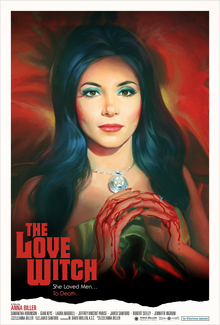
This was an interesting recommendation from, among other places, Vox. Vox is one of the leading sites nowadays that best represent liberal America so it’s very much pro-feminism. That’s interesting because this film has plenty of nudity, both male and female to be fair, but it’s easy to see that it draws viewers mostly through the sexy antics of its female lead Samantha Robinson. Still it contains a remarkably sophisticated discussion of how sexuality empowers women and its very studied throwback to the 1960s makes it impossible to dismiss it as crass commercial fare.
Elaine moves to a small town after the death of her husband. We learn that she thinks of herself as a witch and that she had a hand in his death, so one of the reasons for her moving is to escape the attentions of the police. She moves into a house that is owned by her mentor Barbara and befriends the decorator Trish. She seeks to find a new man immediately and performs a ritual in the house to that effect. Soon afterwards, she meets Wayne, a literature professor at the local university and successfully seduces him. She has him drink a hallucinogenic concoction and has sex with him but he dies the next morning. She is not altogether sad however as he has become overly emotional and needy so she buries him in his own yard. Her next target is Trish’s husband Richard while she is away on a business trip but the disappearance of Wayne soon draws the attention of the local police to her, especially the handsome and confident detective Griff.
The whole thing is filmed to make look as if it were a 1960s film to capture the free love movement of that era I suppose, but there are intrusive anachronisms such as mobile phones and modern car models, to remind the viewer that it’s set in the present day. The performers even use a deliberately stilted acting style to evoke the earlier era. The result is a kitschy and garish production that superficially feels like a B-movie of yesterday but is so carefully calibrated to achieve that effect that you can’t help but be impressed by its production standards. I love how Elaine’s spellbook and magical paraphernalia look like objects right out of a fairy tale. For goodness’ sake, it even has a ren-faire scene in which the characters sing ballads in cheap costumes which is totally ridiculous and completely awesome.
The film’s discussions about feminism may not contain much that is new, as my wife notes. Elaine claims that her unbridled sexuality is a form of female empowerment while Trish counters that giving men exactly what they want is submitting to the patriarchy and contributes to the status quo. At the same time, both come across as being desperately needy for the approval of men, which is hardly a very feminist message. Still, novel or not, I’m all kinds of thrilled that a film manages to have a conversation about these themes at all. I think even my wife got a kick out of the observation that most men aren’t capable of recognizing a used tampon when they see one, despite it being a fixture of women’s lives. I certainly didn’t!
All in all, The Love Witch is not a terribly serious or deep film but I admire how it uses retro aesthetics to talk about themes that are modern and relevant today. I think its self-awareness and bold use of selective nudity makes it brilliantly creative, making it an incredibly fun film. I consider this a rousing success by its auteur, Anna Biller, a noted feminist filmmaker who both wrote and directed it.
One thought on “The Love Witch (2016)”